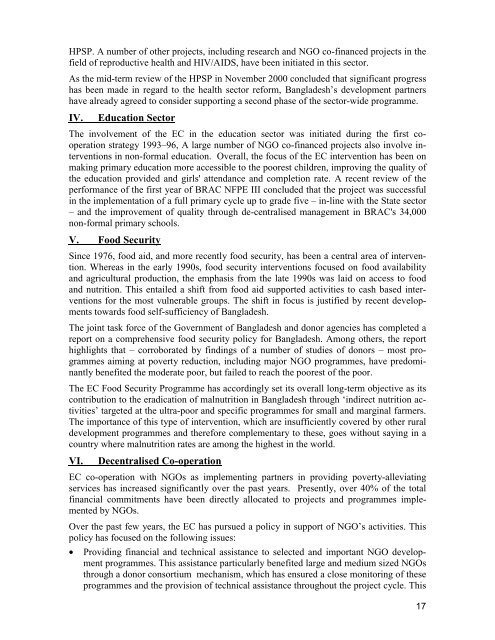EC Country Strategy Paper for Bangladesh 2002-2006
EC Country Strategy Paper for Bangladesh 2002-2006
EC Country Strategy Paper for Bangladesh 2002-2006
Create successful ePaper yourself
Turn your PDF publications into a flip-book with our unique Google optimized e-Paper software.
HPSP. A number of other projects, including research and NGO co-financed projects in the<br />
field of reproductive health and HIV/AIDS, have been initiated in this sector.<br />
As the mid-term review of the HPSP in November 2000 concluded that significant progress<br />
has been made in regard to the health sector re<strong>for</strong>m, <strong>Bangladesh</strong>’s development partners<br />
have already agreed to consider supporting a second phase of the sector-wide programme.<br />
IV. Education Sector<br />
The involvement of the <strong>EC</strong> in the education sector was initiated during the first cooperation<br />
strategy 1993–96, A large number of NGO co-financed projects also involve interventions<br />
in non-<strong>for</strong>mal education. Overall, the focus of the <strong>EC</strong> intervention has been on<br />
making primary education more accessible to the poorest children, improving the quality of<br />
the education provided and girls' attendance and completion rate. A recent review of the<br />
per<strong>for</strong>mance of the first year of BRAC NFPE III concluded that the project was successful<br />
in the implementation of a full primary cycle up to grade five – in-line with the State sector<br />
– and the improvement of quality through de-centralised management in BRAC's 34,000<br />
non-<strong>for</strong>mal primary schools.<br />
V. Food Security<br />
Since 1976, food aid, and more recently food security, has been a central area of intervention.<br />
Whereas in the early 1990s, food security interventions focused on food availability<br />
and agricultural production, the emphasis from the late 1990s was laid on access to food<br />
and nutrition. This entailed a shift from food aid supported activities to cash based interventions<br />
<strong>for</strong> the most vulnerable groups. The shift in focus is justified by recent developments<br />
towards food self-sufficiency of <strong>Bangladesh</strong>.<br />
The joint task <strong>for</strong>ce of the Government of <strong>Bangladesh</strong> and donor agencies has completed a<br />
report on a comprehensive food security policy <strong>for</strong> <strong>Bangladesh</strong>. Among others, the report<br />
highlights that – corroborated by findings of a number of studies of donors – most programmes<br />
aiming at poverty reduction, including major NGO programmes, have predominantly<br />
benefited the moderate poor, but failed to reach the poorest of the poor.<br />
The <strong>EC</strong> Food Security Programme has accordingly set its overall long-term objective as its<br />
contribution to the eradication of malnutrition in <strong>Bangladesh</strong> through ‘indirect nutrition activities’<br />
targeted at the ultra-poor and specific programmes <strong>for</strong> small and marginal farmers.<br />
The importance of this type of intervention, which are insufficiently covered by other rural<br />
development programmes and there<strong>for</strong>e complementary to these, goes without saying in a<br />
country where malnutrition rates are among the highest in the world.<br />
VI. Decentralised Co-operation<br />
<strong>EC</strong> co-operation with NGOs as implementing partners in providing poverty-alleviating<br />
services has increased significantly over the past years. Presently, over 40% of the total<br />
financial commitments have been directly allocated to projects and programmes implemented<br />
by NGOs.<br />
Over the past few years, the <strong>EC</strong> has pursued a policy in support of NGO’s activities. This<br />
policy has focused on the following issues:<br />
• Providing financial and technical assistance to selected and important NGO development<br />
programmes. This assistance particularly benefited large and medium sized NGOs<br />
through a donor consortium mechanism, which has ensured a close monitoring of these<br />
programmes and the provision of technical assistance throughout the project cycle. This<br />
17

















